#what if the fear avatars had a swing dance club
Text
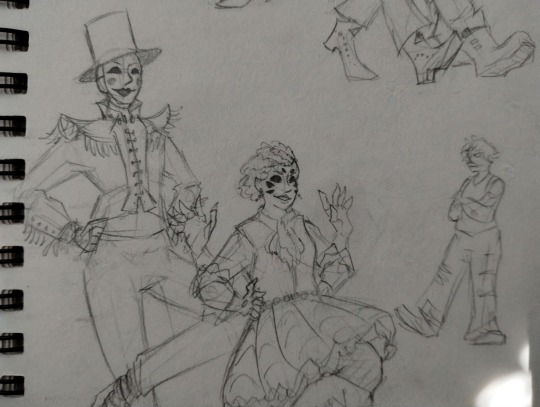
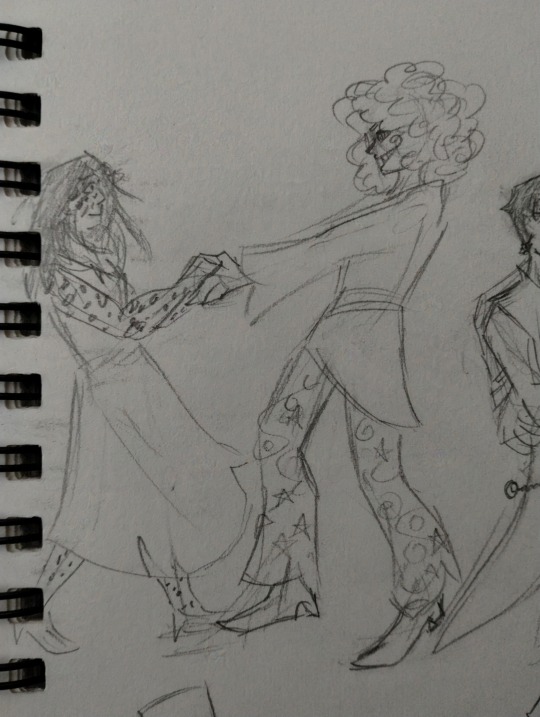


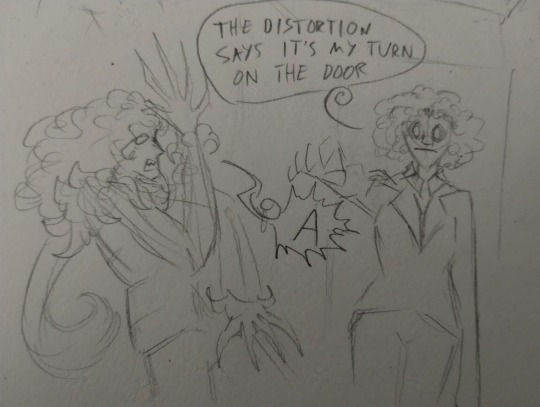
women,,
#the magnus archives#tma#vieramars art#nikola orsinov#annabelle cane#jane prentiss#helen the distortion#melanie king#daisy tonner#michael's there too#they're doing the shim sham in the first sketch :)#what if the fear avatars had a swing dance club#yknow#i've gone feral about this idea before i just can't find my old post
46 notes
·
View notes
Photo
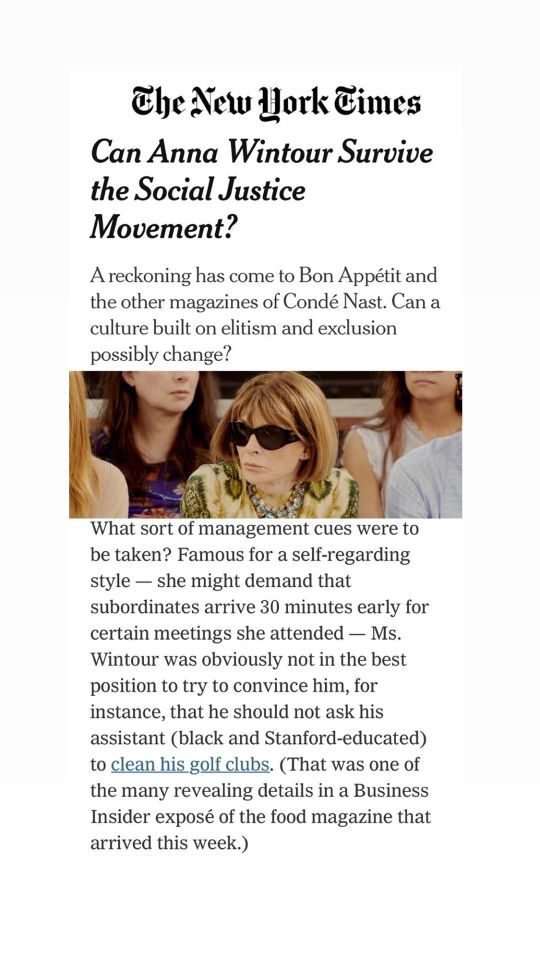
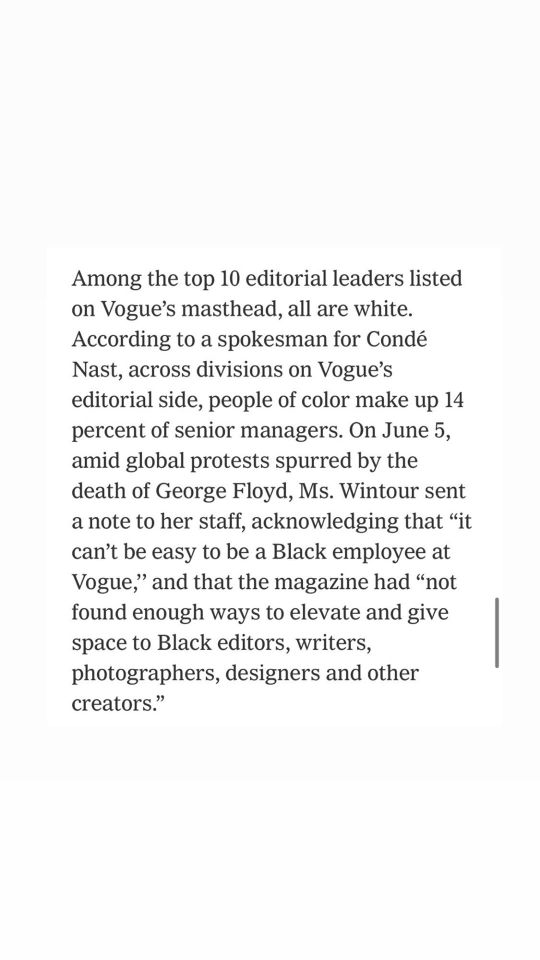
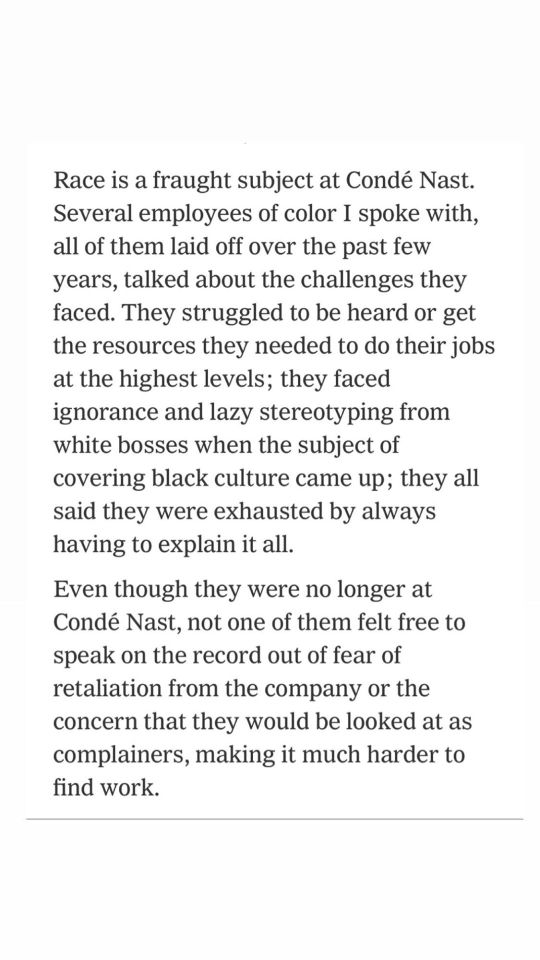
Can Anna Wintour Survive the Social Justice Movement?
A reckoning has come to Bon Appétit and the other magazines of Condé Nast. Can a culture built on elitism and exclusion possibly change?On Monday, as swiftly as a 9-iron taken to a tee at Augusta, Adam Rapoport resigned as the editor in chief of Bon Appétit magazine after a damning Halloween photo circulated on social media that morning. Drawn from the vast insensitivity archives to which so many influential people have made inadvertent submissions, the picture, from 2004, shows him costumed in a tank top and thick chain necklace as his wife’s “papi,’’ the term she attached to it in an Instagram post several years later.As it happened, Mr. Rapoport had been facing mounting grievance from his staff about the magazine’s demeaning treatment of employees and freelancers of color and the dubious ways in which its popular video division presented culturally appropriated cooking. But these apparently were insufficient grounds for forcing him out.Over and over, power structures seem to require that accusations of racial bias are documented by photographic evidence — proof to override a reflexive or simply inconvenient skepticism. Police officers abused their authority for decades without consequence. It was not until a growing body of video footage revealed all the brutality, and the systemic prejudice at the heart of it, that the world began to express the outrage there to be mined all along — justice by iPhone.In that sense, Mr. Rapoport’s ouster at the hands of a camera was entirely fitting. Bon Appétit belongs to Condé Nast, a media empire perhaps unrivaled by any institution on earth in its supplication to image. For decades, both at the level of corporate culture and branded worldview, the company’s lifestyle magazines have held to the notion that there are “right’’ people and wrong people, a determination made by birthright.
There are the rich, and there are the dismissible; the great looking, and the condemned — a paradigm that has now become dangerously untenable, and one the company has been striving to change.Within the Condé Nast framework, autocratic bosses were left to do whatever they pleased — subjugating underlings to hazing rituals with no seeming end point. So much was excusable in the name of beauty and profit. “Difficulty,” Kim France, a former editor in chief of Lucky magazine, told me, “was regarded as brilliance.
”No one at Condé Nast has had more of an outsize reputation for imperiousness wed to native talent than Anna Wintour, the editor of Vogue, the artistic director of the company and more recently its “global content adviser’’ as well. Mr. Rapoport, who spent 20 years at the company and turned around an ailing product in Bon Appétit, reported to her.What sort of management cues were to be taken? Famous for a self-regarding style — she might demand that subordinates arrive 30 minutes early for certain meetings she attended — Ms. Wintour was obviously not in the best position to try to convince him, for instance, that he should not ask his assistant (black and Stanford-educated) to clean his golf clubs. (That was one of the many revealing details in a Business Insider exposé of the food magazine that arrived this week.)Race is a fraught subject at Condé Nast. Several employees of color I spoke with, all of them laid off over the past few years, talked about the challenges they faced. They struggled to be heard or get the resources they needed to do their jobs at the highest levels; they faced ignorance and lazy stereotyping from white bosses when the subject of covering black culture came up; they all said they were exhausted by always having to explain it all.
Even though they were no longer at Condé Nast, not one of them felt free to speak on the record out of fear of retaliation from the company or the concern that they would be looked at as complainers, making it much harder to find work.Editors’ PicksHotels Transformed New York’s Social Life. Now What?Solving the Mystery of What Became of J.F.K.’s Other Patrol BoatOne former staff member who is black could not fail to see the irony in being made to go to unconscious bias training — which became mandatory at the company early last year — only then to lose a big chunk of his portfolio shortly thereafter. “I felt so devalued,’’ he said, “after working so hard.’’Unconscious bias training is supposed to alert you to your blind spots in your perception of people and ideas. But at the level of corporate and creative governance, the programming at Condé Nast has not been seamlessly woven into the company’s broader philosophy. Last month, during a round of layoffs, in which 100 people were let go amid the economic calamities of Covid-19, the company dismissed three Asian-American editors, all of whom covered culture at different publications.Among the top 10 editorial leaders listed on Vogue��s masthead, all are white. According to a spokesman for Condé Nast, across divisions on Vogue’s editorial side, people of color make up 14 percent of senior managers. On June 5, amid global protests spurred by the death of George Floyd, Ms. Wintour sent a note to her staff, acknowledging that “it can’t be easy to be a Black employee at Vogue,’’ and that the magazine had “not found enough ways to elevate and give space to Black editors, writers, photographers, designers and other creators.”Although Vogue has made a greater effort to feature black women on its covers in recent years — Rihanna, Serena Williams, Lupita Nyong’o — the gate swings open far more easily for those who are not. And in this particular area, too, legacy weighs heavily. When LeBron James made history as the first black man to grace the cover in 2008, he shared the space with a white supermodel, Gisele Bündchen, who appeared as a damsel in his clutches, an unmistakable reference to King Kong.
A spokesman at Condé Nast admitted that much progress needs to be made in regard to diversity at the company, but he defended Ms. Wintour’s record, pointing out that she has passionately supported various designers of color throughout her career, helping to raise money for them through her work with the Council of Fashion Designers of America. She also installed two black editors to lead Teen Vogue, genuinely radical in its content, one following the other (Elaine Welteroth and then Lindsay Peoples Wagner).At the same time, Ms. Wintour has presided over Vogue for 32 years, and during that period she has done more to enshrine the values of bloodline, pedigree and privilege than anyone in American media. A brief and very inconclusive list of Ms. Wintour’s assistants in the 21st century includes the Yale-educated daughter of a prominent Miami dance director, the Dartmouth-educated descendant of a major bank president, the Princeton-educated daughter of an Oscar-winning screenwriter and so on. For so long it was central to the Condé Nast ethos that you had to be thin, gorgeous and impeccably credentialed to retrieve someone else’s espresso macchiato.
Even now, as the publishing industry continues to implode and wonderful writers who could really use the work (or at least the prestigious affiliation) abound, Vogue continues to list among its contributing editors people like the German heiress Elisabeth von Thurn und Taxis and many others among the well born. Five years ago, Ms. Thurn und Taxis posted a picture on Instagram of a homeless woman reading Vogue, seated on the sidewalk, with the words, “Paris is full of surprises.” Vogue quickly issued a statement, calling the gesture distasteful, and then proceeded to run her byline on its website at least 10 more timesLast year, Grace Coddington, another contributor, who had held enormous influence over what was shot for Vogue and how, in her many years as the magazine’s creative director, was photographed with her collection of “mammy’’ jars, racist ceramics depicting African-American women as servile maids.
Ms. Wintour clearly believes that she can break from the past and kill off any vestiges of a system steeped in the benighted values for which she has become the corporate avatar. The public apology from Bon Appétit was quite startling in its admission of failure, particularly its concession that the magazine “continued to tokenize” the people of color that it did hire.As part of her contribution to this new wave of progressivism, Ms. Wintour wrote a piece for Vogue.com a week after the death of George Floyd, aligning herself with Black Lives Matter and calling on Joe Biden to select a woman of color as his running mate.For someone who had seemed so averse to activism as the world has roiled from inequality for years, it felt like a desperate grasp for relevance. A spokesman for the company bristled at the suggestion, arguing that it is Condé Nast’s job “to cover what’s going on in the culture in the moment.”As it happens, André Leon Talley, who recently wrote a memoir about his complicated relationship with Ms. Wintour, as a black man and longtime former editor at Vogue, also has a lot to say about the current moment. This week in a radio interview with Sandra Bernhard, he offered his opinion about his ex-boss’s professed transformation.“I wanna say one thing, Dame Anna Wintour is a colonial broad; she’s a colonial dame,” he told Ms. Bernhard. “I do not think she will ever let anything get in the way of her white privilege.”
1 note
·
View note
Text
-
Worn a brightly colored accessory with a neutral outfit
Stared out the car window while listening to sad music as if you were in a music video
Danced around your room with the curtains open
Driven through a neighborhood you don't live in blaring indie music from your car
Cut your own bangs with kitchen scissors
Tried on a bunch of wacky outfits in a thrift shop with no real intention of purchasing anything
Gotten a septum piercing
Transferred schools in the middle of the term
Played the ukulele
Thrown a themed costume party
Worn Heelies unironically
DIYed home decor
Filmed one second of your life every day for a year
Sat on a playground swing as an adult
Learned to juggle
Sat in the front row, whether it was class or a concert
Used your Polaroid camera to chronicle a road trip
Been told you're "Heather"
Studied the arts or humanities
Related to at least one Taylor Swift song hardcore
Had the same best friend for several years
Been part of a love triangle
Had a niche hobby or interest not many people have heard of
Watched the sunrise or sunset from an airplane window
Been way too overdressed for the grocery store
Dyed your hair a bright color
Recorded yourself singing to see if you sounded as good as you thought you did
Made a video in the rain
Gone night swimming
Curated a very specific playlist for a very mundane task
Referred to going somewhere super normal (like the gas station) as "an adventure"
Had a "life-changing experience" at summer camp
Performed in a talent show
Considered your pet your best friend
-
Sagittarius - Fire
never saving phone numbers
loopholes
strong unfounded opinions
buying a round of shots
going viral on tiktok
snapchat stories
calling everyone ‘bro’
lapsing into a character
health fads
loving tacky aesthetics
self-organization
will watch any show that has hot people
surfing airbnb for fun
mangonadas
have made someone cry
romance languages
tone-deaf but love karaoke
fun facts
making a day out of one errand
tattoos
silver lining
losing internet once someone shows interest
never paying people back
calling in sick
9/24
Capricorn - Earth
trusting two people
*cracks knuckles*
self-deprecating jokes
owning multiple colors of the same pants
love having an excuse to say no
clothing with pockets
sitting together in silence
sore loser
needing alone time to decompress
no interest in petty drama
compartmentalizing emotions
unsure what to do while someone cries
noticing everything
solution-oriented
called ‘precocious’ as a child
favorite sound is the crossword jingle
rising to meet high expectations
speaking to pet and babies in an adult voice
large iced coffee, black
‘sent from my iPhone’
long-form articles
no sympathy for stupidity
sophisticated neutrals
remember your sat score
8/24
Aquarius - Air
avoiding contact during earnest conversations
history of bad bleach jobs
people watching from afar
have considered a burner phone
only listening to b-sides
have gone by five different nicknames
hating on astrology
tirades
keeping your birthday a secret
reusable water bottle
hating hugs
using shock humor to alienate people
know exactly where you’d run away to if you decided to start a new life
self-described “bad influence”
jstor subscription
encyclopedic knowledge of niche pop culture
deliberately esoteric
“what’s the science?”
71 unread messages
over-ear headphones
a piercing you did yourself
most active between 3 and 6 am
favorite celeb is David Byrne or David Lynch
hiding inside a hoodie
2/24
Pisces - Water
chipped nail polish
believing your own lies
not wanting to upset someone by telling them they’ve upset you
crying when someone else cries
swaddling yourself in a cardigan
donating to wikipedia our of guilt
batting eyelashes
thinking everything is a sign
mystery novels
have plans to ‘find yourself’
battery always under 20%
working on asserting yourself
“I’m fine, but how are you?”
rich inner world
ethical veganism
house slippers
sitting on the floor of the shower
talented artist
small handwriting
picking ‘truth’ in truth or dare
reacting to messages with a heart emoji
starting sentences with ‘sorry’
planning birthday presents months in advance
happy crying
3/24
-
Leo - Fire
reposting birthday wishes on Instagram stories
lip gloss
“I thought you’d be a bitch before I met you”
crying on command
showering strangers with compliments
loud laugh
giving up if not instantly good at something
new outfit for every occasion
waiting exactly as long as the other person to text back
awful at apologies
movies with makeover montages
craving validation
thinking everyone should have an ego
other people’s parents love you
sleeping with six pillows
dumping people before they can dump you
love being the therapist friend
president of a club in high school
the protagonist of reality
planning a memoir
arriving late with beverage in hand
pipe dreams
good at icebreaker games
tipping 30%
4/24
Virgo - Earth
saunas
needing 2+ hours to fall asleep
having the last word
standards so high even you can’t reach
stress-induced IBS
modifying your restaurant order
vices
turned off by rudeness
matching pajama sets
knowing which fork is which
self-doubt
currently worried someone is mad at you
observational humor
complex self-soothing rituals
Youtube tutorials
subtly sensual
creating problems to fuss over
editing articles as you read them
talking points
checking weather before getting dressed
chamomile tea
making sure your friends know their worth
“I’ll pencil you in”
realizing your jam has been clenched
10/24
Libra - Air
you’re ‘not on social media’
...but you meticulously curate your finsta
jack off all trades
belonging to 15 distinct friend groups
only ‘reading’ audio-books
fantasy movies
situationships
returning favors
natural deodorant
cooking elaborate meals for one
mediating friend drama
can’t take a compliment
“I could make that myself”
passive aggression
power couple aspirations
fusion foods
fear of being forgotten
meet-cutes
inspirational quotes
watching music videos instead of just playing the songs
overly familiar pet names
underestimating the effects of your actions
“no makeup” makeup look
taking it easy
5/24
Scorpio
collecting screenshots just in case
hyperbolic speaker
slouching
alibis
keeping everyone’s secret
loving your hometown
mirror above the bed
hate when people waste your tame
evasive responses to innocuous questions
performative sigh
human lie detector
penetrating eye contact
secretly wish someone would scale your emotional walls
“what’s the catch?”
decoding algorithms
remembering every embarrassing thing you’ve ever done
testing people’s allegiance
a natural at networking
refusing to acknowledge dropped hints
falling in love quickly and intensely
“fool me once” mentality
weighing your options
fiercely loyal friend
10/24
0 notes
Text
Can Anna Wintour Survive the Social Justice Movement?
big city
A reckoning has come to Bon Appétit and the other magazines of Condé Nast. Can a culture built on elitism and exclusion possibly change?
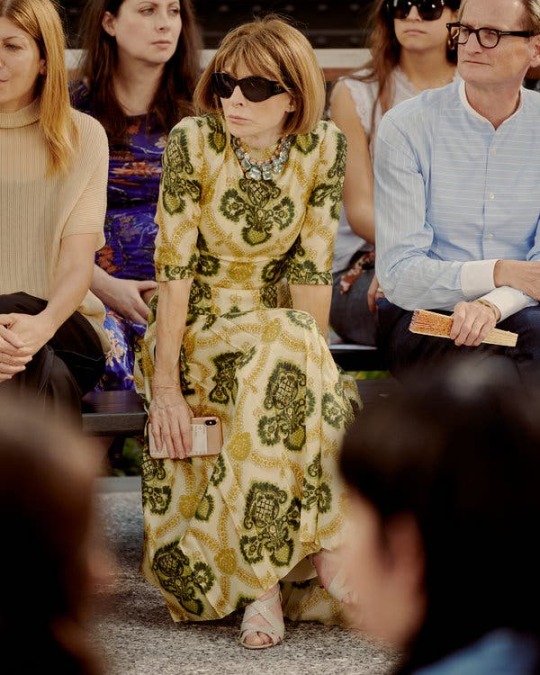
Anna Wintour at the Coach show last spring.Credit...Vincent Tullo for The New York Times

June 11, 2020
On Monday, as swiftly as a 9-iron taken to a tee at Augusta, Adam Rapoport resigned as the editor in chief of Bon Appétit magazine after a damning Halloween photo circulated on social media that morning. Drawn from the vast insensitivity archives to which so many influential people have made inadvertent submissions, the picture, from 2004, shows him costumed in a tank top and thick chain necklace as his wife’s “papi,’’ the term she attached to it in an Instagram post several years later.
As it happened, Mr. Rapoport had been facing mounting grievance from his staff about the magazine’s demeaning treatment of employees and freelancers of color and the dubious ways in which its popular video division presented culturally appropriated cooking. But these apparently were insufficient grounds for forcing him out.
Over and over, power structures seem to require that accusations of racial bias are documented by photographic evidence — proof to override a reflexive or simply inconvenient skepticism. Police officers abused their authority for decades without consequence. It was not until a growing body of video footage revealed all the brutality, and the systemic prejudice at the heart of it, that the world began to express the outrage there to be mined all along — justice by iPhone.
In that sense, Mr. Rapoport’s ouster at the hands of a camera was entirely fitting. Bon Appétit belongs to Condé Nast, a media empire perhaps unrivaled by any institution on earth in its supplication to image. For decades, both at the level of corporate culture and branded worldview, the company’s lifestyle magazines have held to the notion that there are “right’’ people and wrong people, a determination made by birthright. There are the rich, and there are the dismissible; the great looking, and the condemned — a paradigm that has now become dangerously untenable, and one the company has been striving to change.
Within the Condé Nast framework, autocratic bosses were left to do whatever they pleased — subjugating underlings to hazing rituals with no seeming end point. So much was excusable in the name of beauty and profit. “Difficulty,” Kim France, a former editor in chief of Lucky magazine, told me, “was regarded as brilliance.”
No one at Condé Nast has had more of an outsize reputation for imperiousness wed to native talent than Anna Wintour, the editor of Vogue, the artistic director of the company and more recently its “global content adviser’’ as well. Mr. Rapoport, who spent 20 years at the company and turned around an ailing product in Bon Appétit, reported to her.
What sort of management cues were to be taken? Famous for a self-regarding style — she might demand that subordinates arrive 30 minutes early for certain meetings she attended — Ms. Wintour was obviously not in the best position to try to convince him, for instance, that he should not ask his assistant (black and Stanford-educated) to clean his golf clubs. (That was one of the many revealing details in a Business Insider exposé of the food magazine that arrived this week.)
Race is a fraught subject at Condé Nast. Several employees of color I spoke with, all of them laid off over the past few years, talked about the challenges they faced. They struggled to be heard or get the resources they needed to do their jobs at the highest levels; they faced ignorance and lazy stereotyping from white bosses when the subject of covering black culture came up; they all said they were exhausted by always having to explain it all.
Even though they were no longer at Condé Nast, not one of them felt free to speak on the record out of fear of retaliation from the company or the concern that they would be looked at as complainers, making it much harder to find work.
One former staff member who is black could not fail to see the irony in being made to go to unconscious bias training — which became mandatory at the company early last year — only then to lose a big chunk of his portfolio shortly thereafter. “I felt so devalued,’’ he said, “after working so hard.’’
Unconscious bias training is supposed to alert you to your blind spots in your perception of people and ideas. But at the level of corporate and creative governance, the programming at Condé Nast has not been seamlessly woven into the company’s broader philosophy. Last month, during a round of layoffs, in which 100 people were let go amid the economic calamities of Covid-19, the company dismissed three Asian-American editors, all of whom covered culture at different publications.
Among the top 10 editorial leaders listed on Vogue’s masthead, all are white. According to a spokesman for Condé Nast, across divisions on Vogue’s editorial side, people of color make up 14 percent of senior managers. On June 5, amid global protests spurred by the death of George Floyd, Ms. Wintour sent a note to her staff, acknowledging that “it can’t be easy to be a Black employee at Vogue,’’ and that the magazine had “not found enough ways to elevate and give space to Black editors, writers, photographers, designers and other creators.”
Although Vogue has made a greater effort to feature black women on its covers in recent years — Rihanna, Serena Williams, Lupita Nyong’o — the gate swings open far more easily for those who are not. And in this particular area, too, legacy weighs heavily. When LeBron James made history as the first black man to grace the cover in 2008, he shared the space with a white supermodel, Gisele Bündchen, who appeared as a damsel in his clutches, an unmistakable reference to King Kong.
A spokesman at Condé Nast admitted that much progress needs to be made in regard to diversity at the company, but he defended Ms. Wintour’s record, pointing out that she has passionately supported various designers of color throughout her career, helping to raise money for them through her work with the Council of Fashion Designers of America. She also installed two black editors to lead Teen Vogue, genuinely radical in its content, one following the other (Elaine Welteroth and then Lindsay Peoples Wagner).
At the same time, Ms. Wintour has presided over Vogue for 32 years, and during that period she has done more to enshrine the values of bloodline, pedigree and privilege than anyone in American media. A brief and very inconclusive list of Ms. Wintour’s assistants in the 21st century includes the Yale-educated daughter of a prominent Miami dance director, the Dartmouth-educated descendant of a major bank president, the Princeton-educated daughter of an Oscar-winning screenwriter and so on. For so long it was central to the Condé Nast ethos that you had to be thin, gorgeous and impeccably credentialed to retrieve someone else’s espresso macchiato.
Even now, as the publishing industry continues to implode and wonderful writers who could really use the work (or at least the prestigious affiliation) abound, Vogue continues to list among its contributing editors people like the German heiress Elisabeth von Thurn und Taxis and many others among the well born. Five years ago, Ms. Thurn und Taxis posted a picture on Instagram of a homeless woman reading Vogue, seated on the sidewalk, with the words, “Paris is full of surprises.” Vogue quickly issued a statement, calling the gesture distasteful, and then proceeded to run her byline on its website at least 10 more times
Last year, Grace Coddington, another contributor, who had held enormous influence over what was shot for Vogue and how, in her many years as the magazine’s creative director, was photographed with her collection of “mammy’’ jars, racist ceramics depicting African-American women as servile maids.
Ms. Wintour clearly believes that she can break from the past and kill off any vestiges of a system steeped in the benighted values for which she has become the corporate avatar. The public apology from Bon Appétit was quite startling in its admission of failure, particularly its concession that the magazine “continued to tokenize” the people of color that it did hire.
As part of her contribution to this new wave of progressivism, Ms. Wintour wrote a piece for Vogue.com a week after the death of George Floyd, aligning herself with Black Lives Matter and calling on Joe Biden to select an African-American woman as his running mate.
For someone who had seemed so averse to activism as the world has roiled from inequality for years, it felt like a desperate grasp for relevance. A spokesman for the company bristled at the suggestion, arguing that it is Condé Nast’s job “to cover what’s going on in the culture in the moment.”
As it happens, André Leon Talley, who recently wrote a memoir about his complicated relationship with Ms. Wintour, as a black man and longtime former editor at Vogue, also has a lot to say about the current moment. This week in a radio interview with Sandra Bernhard, he offered his opinion about his ex-boss’s professed transformation.
“I wanna say one thing, Dame Anna Wintour is a colonial broad; she’s a colonial dame,” he told Ms. Bernhard. “I do not think she will ever let anything get in the way of her white privilege.”
Read More
Read the full article
0 notes